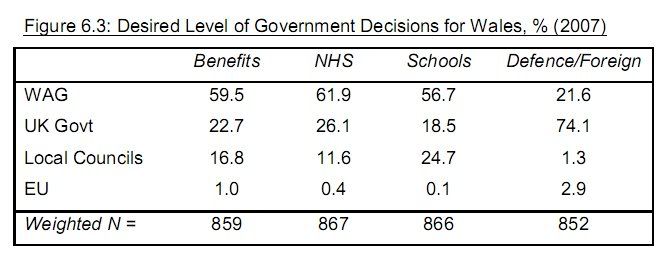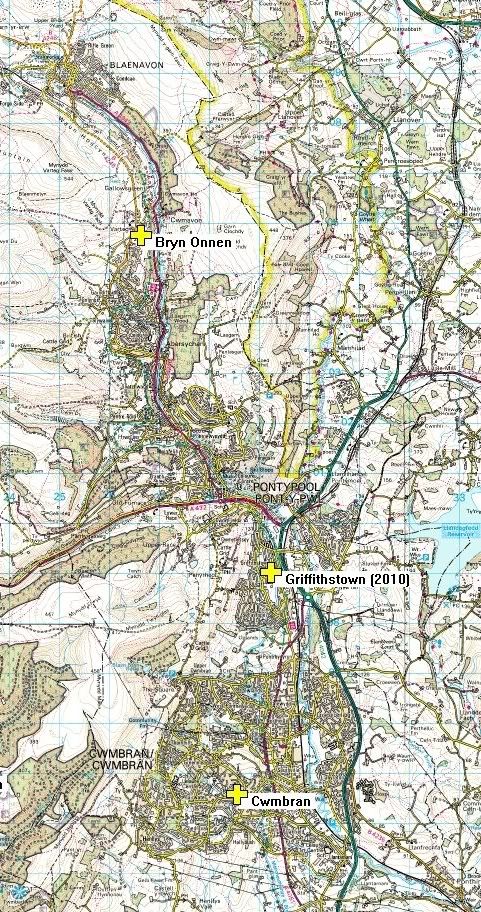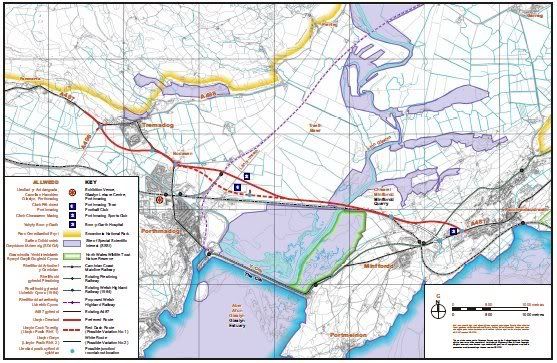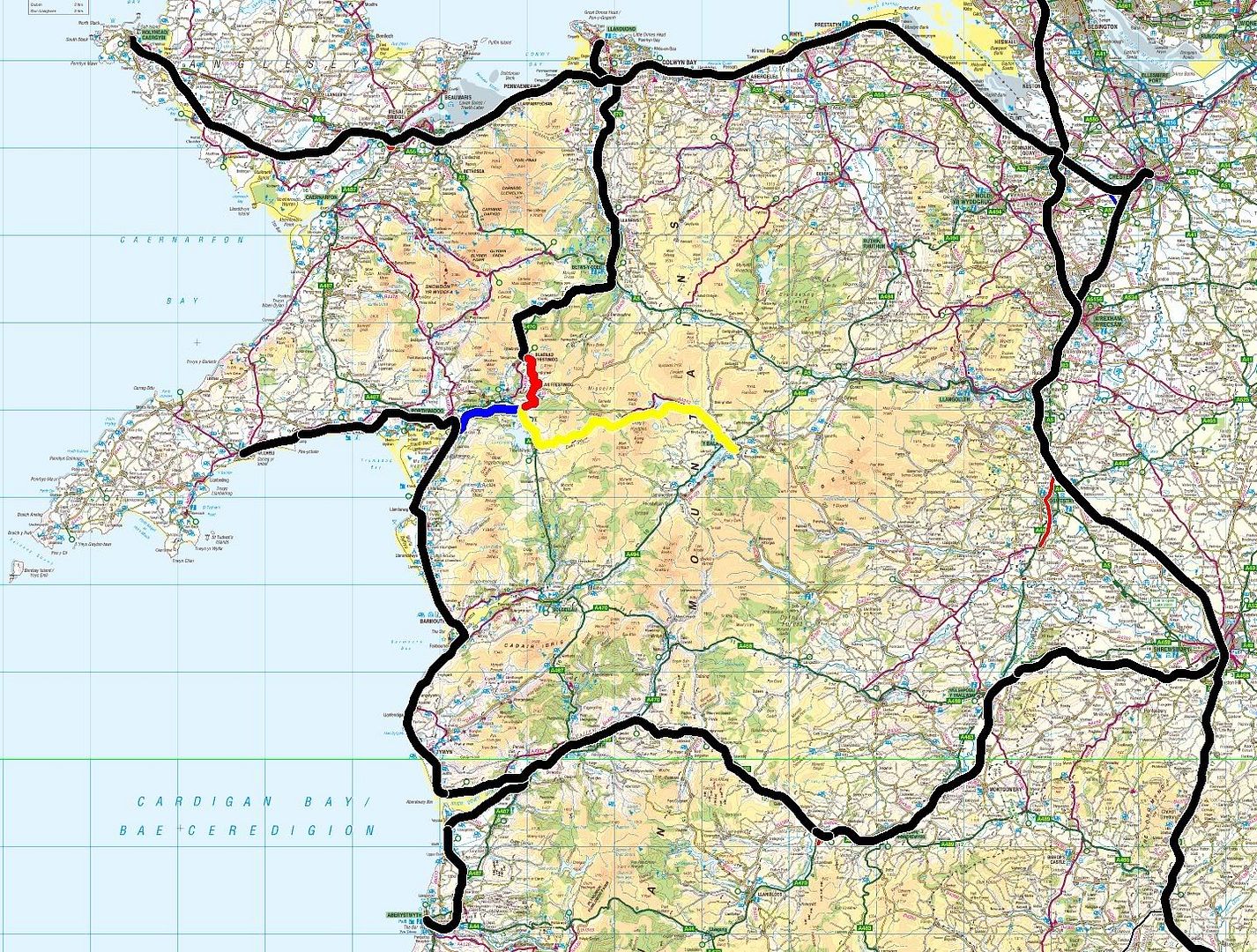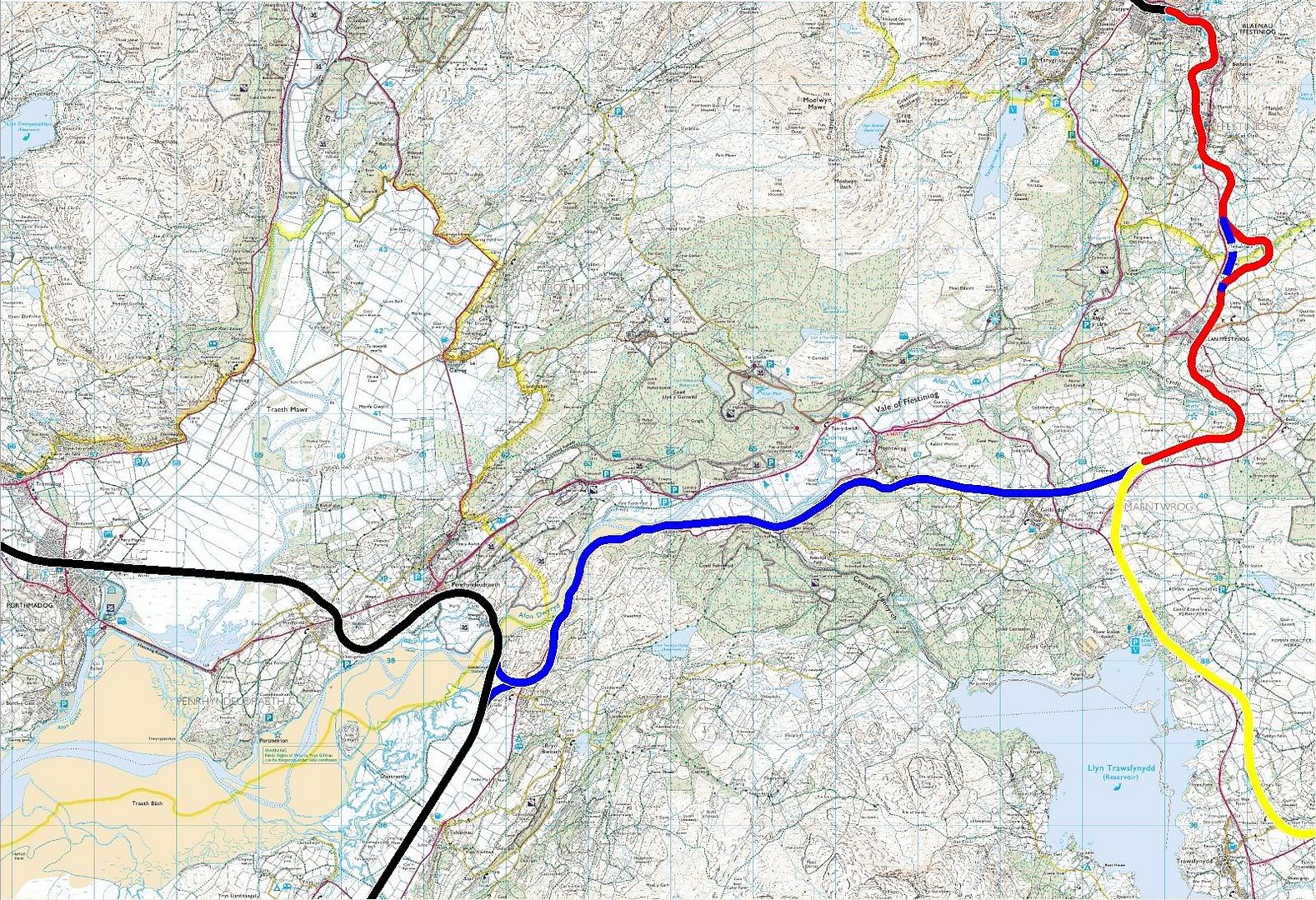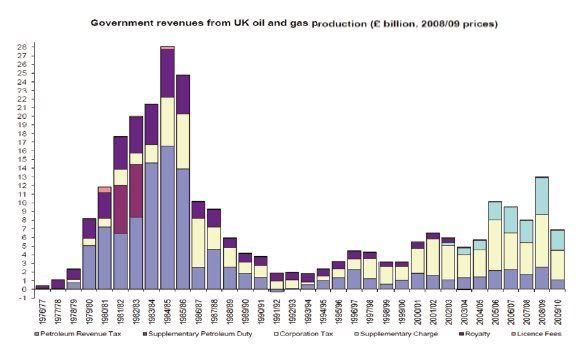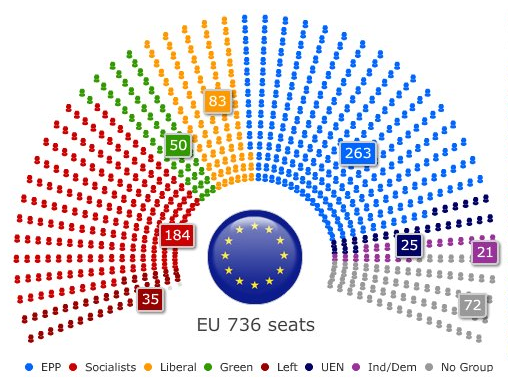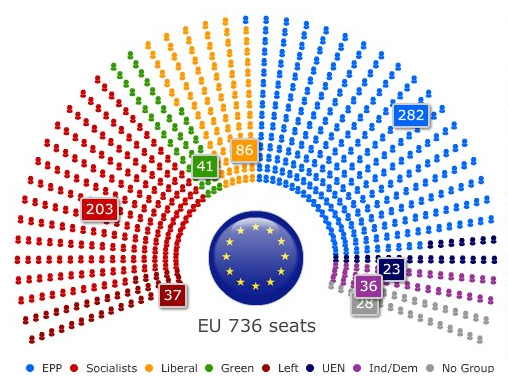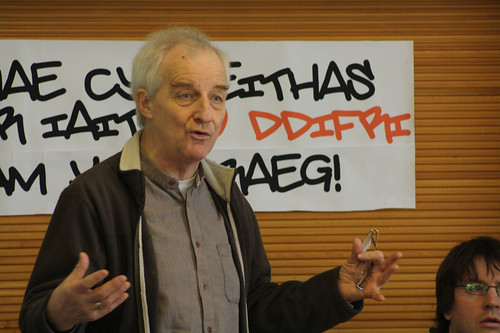In my last post I looked at what the results of the recent European election might mean for Plaid in Westminster, so now it is time to turn to see what they might mean for the Assembly elections in 2011.
I'll start with an uncomfortable set of figures. If the same votes were cast in the Assembly election as were just cast in the European elections—and if people's second votes were all cast in the same way as their first votes—it would give this result:
Labour ... 20 (16 FPTP, 4 regional)
Conservative ... 17 (16 FPTP, 1 regional)
Plaid ... 11 (7 FPTP, 4 regional)
UKIP ... 6 (0 FPTP, 6 regional)
LibDem ... 6 (1 FPTP, 5 regional)
It is interesting to note that Labour, despite being second in the poll, would still be the largest party. This is a result of Wales not having enough regional seats to correct the distortion caused by the FPTP element of the voting system. This shouldn't be a surprise, because Labour set the system up to give them this advantage.
And of course it's also true to say that people won't necessarily vote the same way in the Assembly elections as they do in other elections. But even so the news doesn't look good for Plaid. And that means we have to do some serious thinking if we are to hold on to, let alone improve on, our current tally of fifteen seats.
I want to look at three things in particular: UKIP and the anti-vote, Plaid's own targets and strategies, and electoral alliances.
1. UKIP and the anti-vote
It's very easy for the other parties to say that UKIP only did well as a protest vote, especially because of the expense scandal at Westminster. But that, in my opinion, is only a very small factor. UKIP in fact has a far worse record than other parties on financial irregularities: one of their MEPs was jailed for making false claims and another is facing fraud charges.
It is more realistic to say that UKIP did as well as they did simply because of their policy position, rather than because of the expenses scandal. In fact UKIP in the UK as a whole got just about the same share of the vote in 2009 as they did in 2004. 16.5% as opposed to 16.2%.
To my mind UKIP's appeal is the simplicity of its position. On the subject of the EU, they know full well that people are so little informed about the EU that the European elections cannot be fought on the ground of policies in Europe ... it can only be fought on the black-and-white contrast of whether we should be in the EU or out of it. All the other big parties want us to remain part of the EU, so UKIP has a "unique selling point" which it can take full advantage of.
It also demonstrates that it's a lot easier to be against something than for it. An opposition party that has no chance of being in government can promise the earth, but knows it will never have to deliver anything.
-
So the question is whether UKIP might be able to play the same game in Wales. The answer is yes, but this time on devolution. All the big parties are now in favour of devolution and want to keep the National Assembly. UKIP wants to abolish it and have MPs to the job instead, so UKIP has a similar "unique selling point" ... it has another way of attracting the "anti-vote".
It's pointless looking at the statistics that show that an overwhelming majority of people in Wales want devolution. UKIP simply don't need overwhelming majorities, they only need to pick up the votes of those that are opposed to devolution. These are the results of the last four surveys to ask the question:
February 2009 (BBC/ICM)
13% ... Independence (5% outside EU, 8% inside EU)
34% ... Parliament with tax-setting powers
10% ... Parliament with primary law-making powers
21% ... Status quo
19% ... Abolish the Assembly
04% ... Other/don't know
December 2008, published March 2009 (AWC/GfKNOP)
06% ... Independence
37% ... Parliament with tax-setting powers
36% ... Parliament with limited law-making powers
11% ... Abolish the Assembly
10% ... Don't know
June/July 2008 (AWC/GfKNOP)
10% ... Independence
39% ... Parliament with tax-setting powers
31% ... Status quo
15% ... Abolish the Assembly
06% ... Don't know
February 2008 (BBC/ICM)
13% ... Independence (5% outside EU, 8% inside EU)
37% ... Parliament with tax-setting powers
26% ... Status quo
20% ... Abolish the Assembly
03% ... Other/don't know
If 11-20% of people in Wales want to abolish the Assembly, then there will be quite a lot of potential votes for UKIP if they are the only party to campaign on such a platform.
Of course not all of those anti-Assembly votes will go to UKIP, because most of the anti-devolutionists will probably accept that trying to turn the clock back on devolution is a lost cause and so will vote on the issues that matter: health, education and the like. UKIP just don't have a position on these issues.
I don't want to over-inflate UKIP's chances of doing well. In the last Assembly elections they only got 3.95% of the vote. But it would not take very much of an increase to get a regional seat. 6.4% is enough in some regions, 8.5% would get a seat in all five regions.
However I would note that a lot will depend on the Tories. While the Tories were lukewarm about devolution, they could hope to pick up most of the no-to-devolution-at-all-costs vote. The more they move towards a pro-more-devolution position, the more likely it is that UKIP will pick up the no-to-devolution-at-all-costs vote. This might well be the reason why the Tories have point-blank refused to publish the Roberts Report.
2. Plaid's own targets and strategies
My first point was about a potential threat, but the second point I want to make about the Assembly elections is much more concrete. Plaid has good reason to be confident about the seven FPTP seats we hold in the Assembly, however any further FPTP seats that we win are likely to reduce the number of regional seats we win, thus giving us no overall advantage.
In the last post, I said that Neath, the Rhondda and Caerffili were possibilities (no more than that) in the Westminster election. In the Assembly elections these become very much more winnable, simply because Plaid tend to do better in Assembly elections.
In addition to those three, the only other realistic possibilities are Clwyd West, Carmarthen West & South Pembrokeshire, Preseli Pembrokeshire, Aberafan, Cynon, Pontypridd and Islwyn. Thus we have a total of maybe ten FPTP targets, although it has to be said that some of these are remote possibilities.
-
However the problem is that for every one of these seats we win, we lose a regional seat. This has important implications for the way we campaign.
The normal way elections work is for parties to concentrate resources on the seats they hope to win, or those which they fear they might lose. As I've said many times before, Westminster elections are decided on the outcome of less than a hundred marginal seats, and parties put all their effort into those ... ignoring the others at a local level and relying almost entirely on national media coverage.
Plaid are no exception, and we will certainly have to do that for the Westminster elections. But the big mistake would be for us to rely on the same tactic for the Assembly elections. At best it would only mean that we hold our ground ... it would be impossible for us to get more Assembly seats than we currently have by employing it. In order to form a Welsh government, or to be the lead partner in a coalition government, we need to think differently.
-
Because any new FPTP seat that we win will result in us losing a regional seat, the only way we can improve our position is to increase the percentage of the vote throughout each region as opposed to concentrating on the winnable constituency seats. This is particularly true in the three South Wales regions.
Of course that doesn't mean that we don't aim to win the FPTP seats, it simply means that we mustn't concentrate on them at the expense of the less winnable constituencies. Increasing our share of the vote by say 5 or 6% overall is going to count for more than increasing the share of the vote by 10% in a winnable constituency but getting only a small increase in the others.
This isn't as implausible as it might at first seem. A few years ago people would have laughed at Plaid getting a decent share of the vote in many places in the eastern half of Wales. But these are some of the more surprising comparisons between the percentage of the vote we got in the last Assembly elections and what we just got in the European election:
Alyn & Deeside ... up from 6.63% to 9.32%
Wrexham ... up from 9.60% to 13.83%
Brecon & Radnor ... up from 5.47% to 8.00%
Blaenau Gwent ... up from 4.80% to 15.09%
Merthyr ... up from 12.00% to 15.21%
Cardiff North ... up from 7.39% to 9.01%
None of these is a winnable seat, but that's not the point. The aim is to make these sort of previously unlikely gains in our share of the vote across each region, so that we can win another regional seat in order to make up for the one we would otherwise lose by gaining a constituency seat.
-
This also has implications at local level. Quite simply it is not going to be enough for each branch to concentrate its resources only in its own constituency. The stronger branches are going to have to help (in terms of both manpower and money) in those constituencies where our support is less strong. This will require a change of attitude that might be hard, but I'm sure it is the only way that Plaid can get more seats than the fifteen we already have.
3. Electoral alliances
The previous point covered what Plaid can, and I believe should, do as a party. But there is one other way by which we can change the political landscape: by making electoral alliances with other parties and independents.
This will only work in very specific circumstances, but bear with me and I'll explain what these are.
Plaid has very strong support in Caerffili. Perhaps enough to win the seat, perhaps not. I mentioned before that Ron Davies' position has evolved to the point where his views are closer to ours in Plaid than they are to those of any other party. The only big point of difference is independence, which will not be on the agenda for the next ten years.
If he stands and wins as a Plaid candidate, Plaid will lose a regional seat. However if he stands as an independent, but unopposed by Plaid, the chances are that he'll win easily ... and that Plaid will not lose a regional seat.
At first glance this might appear to be electorally dubious, but it isn't. In fact it's exactly what he and John Marek did in 2007. They stood as independents, but Forward Wales stood as a party on the regional lists, so that they would not loose out as a party if either of the two men won a constituency seat. In the end it didn't make any difference, but their thinking was exactly right.
The second situation where an electoral alliance would work is in a region where Plaid has a high number of FPTP seats ... and therefore are unlikely to win an additional seat, or could at most expect to win one additional seat.
Let me explain what I mean by using Mid & West Wales as an example: Plaid are in all probability going to win 4 of the 8 constituency seats, and might just win a fifth or sixth in Preseli Pembrokeshire or Carmarthen West and South Pembrokeshire. Therefore it would be impossible for us to pick up more than 1 regional seat.
But Plaid share a lot of common values with the Green Party, and the Greens on their own are stronger in MWW than in any other region, polling 6.46% a fortnight ago. If we formed an electoral alliance with the Green Party, we would in essence forgo our chance of winning a regional seat, but would see them win (if all those who cast their second vote for Plaid in 2007 gave their second vote to the Greens instead) three of the four regional seats.
The same would be true of the North Wales region. Plaid would not win the one regional seat they got in 2007, but the Greens would again win three of the four regional seats.
-
Now this again might sound rather dubious, but isn't. There would probably be no way that Plaid could avoid putting up regional candidates in MWW and NW, therefore the success of this strategy would depend entirely on getting different messages across to our supporters in different regions. That is a tremendous challenge.
But if anyone said this strategy was in some way unfair, I would simply point out that the Labour Party set up the system we currently have precisely because it gave them an electoral advantage. In a region like South Wales West, they won 63.63% of the seats (seven out of eleven seats) with only 41.48% of the vote. I would call it redressing the balance ... and of course if we had STV there would be no need to vote tactically.
4. Conclusions
The bottom line is that we want Plaid to either form the next Welsh government or to be the largest party in the next Assembly. But I must warn our leaders and supporters that if we just drift into the election without doing this sort of strategic thinking now we will be lucky to end up with the fifteen seats we currently have, let alone increase them.
To increase our own seats, we need to focus our resources to increase our general share of the vote so that we can win additional FPTP seats without losing regional seats in the three South Wales regions.
However if we form strategic electoral alliances with Ron Davies as an independent, we retain a regional seat that we would otherwise lose. And if we forgo the chance of winning one regional seat in each of MWW and NW regions, the Green party could win up to three seats in each.
We therefore (as the Plaid/Green/Davies group) stand to make a net gain of five seats if we pursue these electoral alliances. There is also a lot of political kudos to be gained by setting this up before the election, so that it affects the way people vote in them, rather than negotiating everything afterwards.
If we want to be the largest party in the next Assembly, we have to think outside the box. I hope my analysis will stimulate debate both within Plaid and with those whose political viewpoint is broadly similar to ours.

